Portfolio of a teacher-speech therapist Pishikina Angelika Vladimirovna
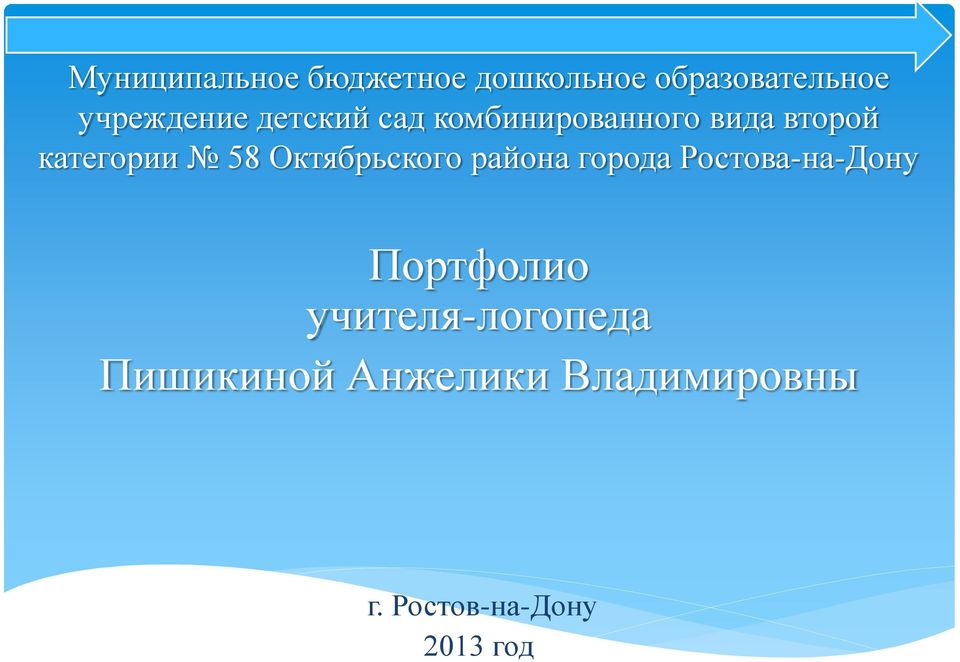
Size: px
Start impression from page:
transcript
1 Municipal budgetary preschool educational institution kindergarten of a combined type of the second category 58 of the Oktyabrsky district of the city of Rostov-on-Don Portfolio of a speech therapist Pishikina Anzhelika Vladimirovna Rostov-on-Don 2013

2 There is such a profession in the world, To give joy to children. Correcting speech defects, It is beautiful to teach them to speak. Every day with the tongue to engage, Achieving new victories. And do not be shy about your mistakes, Give a full answer to questions. Who will put all the sounds in their place, To make speech flow like a river? Who will teach you that in the word "rocket" you need to say "ra" and not "la"? I have been in the profession since the last century, Children have been given so many years. I love my job and am proud to be a speech therapist.

3 General information Date of birth: April 10, 1970 Education: Higher, SFedU Year of graduation: 2010 Diploma specialty: Speech therapist Work experience: 19 years Work experience in this institution: 13 years Qualification: Higher
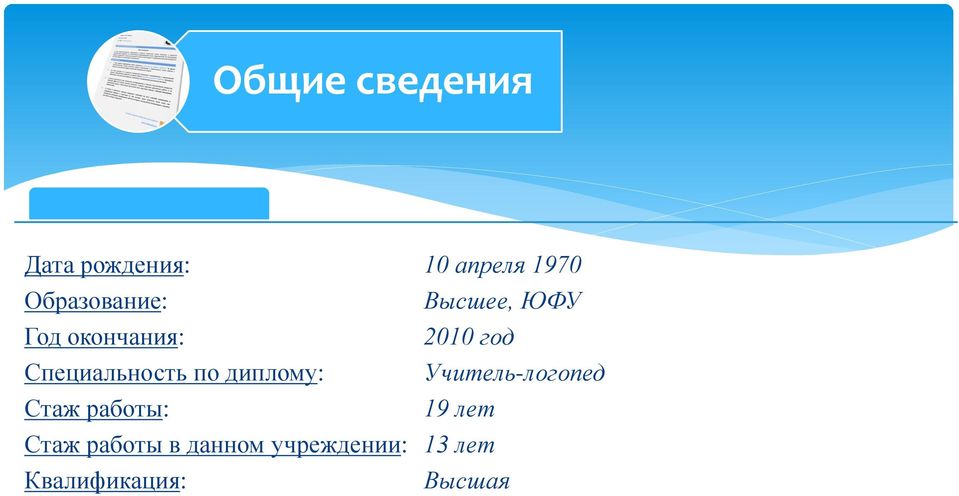
4 Education Southern Federal University Specialty: Speech Therapy Qualification awarded: Speech therapist teacher Rostov State Pedagogical University Specialty: Preschool Pedagogy and Psychology Qualification awarded: Teacher of Preschool Pedagogy and Psychology Rostovskoye -on-Don Pedagogical College 2 "Specialty: "Teaching in the primary grades of a comprehensive school" Qualification awarded: Primary school teacher
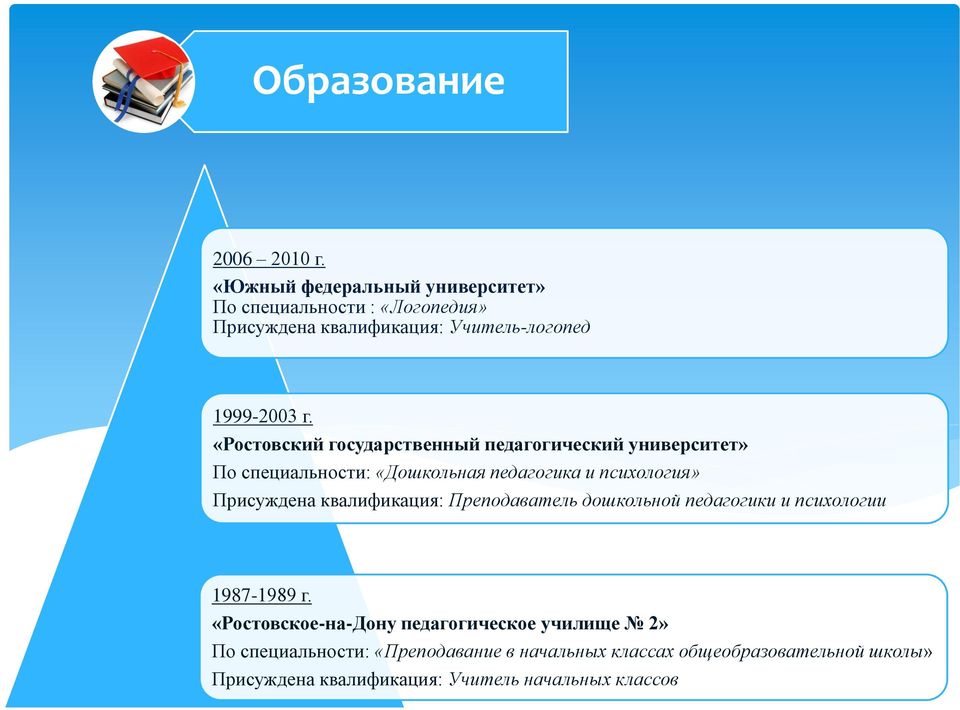

6 Correctional work Purpose: to provide speech therapy assistance to students who have deviations in the development of oral speech, which in the future can cause a violation of written speech, that is, the prevention of secondary disorders, as well as the correction of existing violations of written speech. Tasks: correction of violations of oral and written speech; timely prevention and overcoming of difficulties in the assimilation of educational programs; clarification of special knowledge among teachers, parents (legal representatives) of students
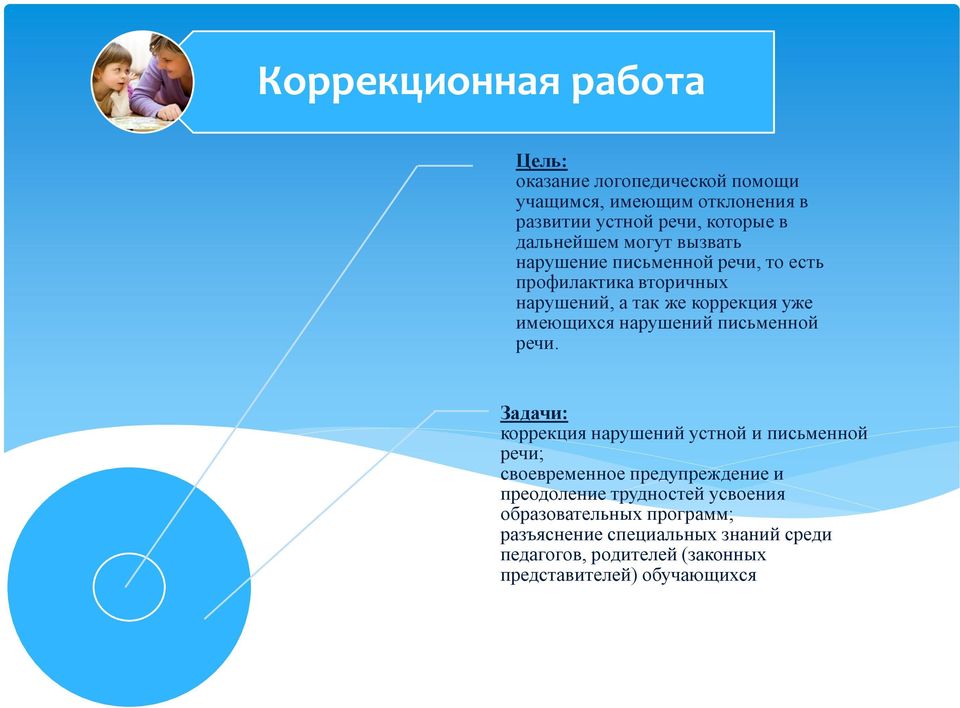
7 Correctional work The activity of a speech therapist teacher is aimed at providing correctional assistance to children with problems in speech development, based on the principles: natural conformity, scientific character, consistency, interaction. Creativity is achieved through means: traditional and non-traditional methods and techniques; multifaceted developmental tasks; innovative and gaming technologies; interaction with all parts of the pedagogical process Directions: - development of the sound side of speech, correction of pronunciation defects; - the formation of coherent expressive speech on the basis of correctly pronounced sounds; - development and improvement of psychological prerequisites for learning; - formation of full-fledged educational skills; - development and improvement of communicative readiness for learning; - formation of communicative skills and abilities adequate to educational activity.
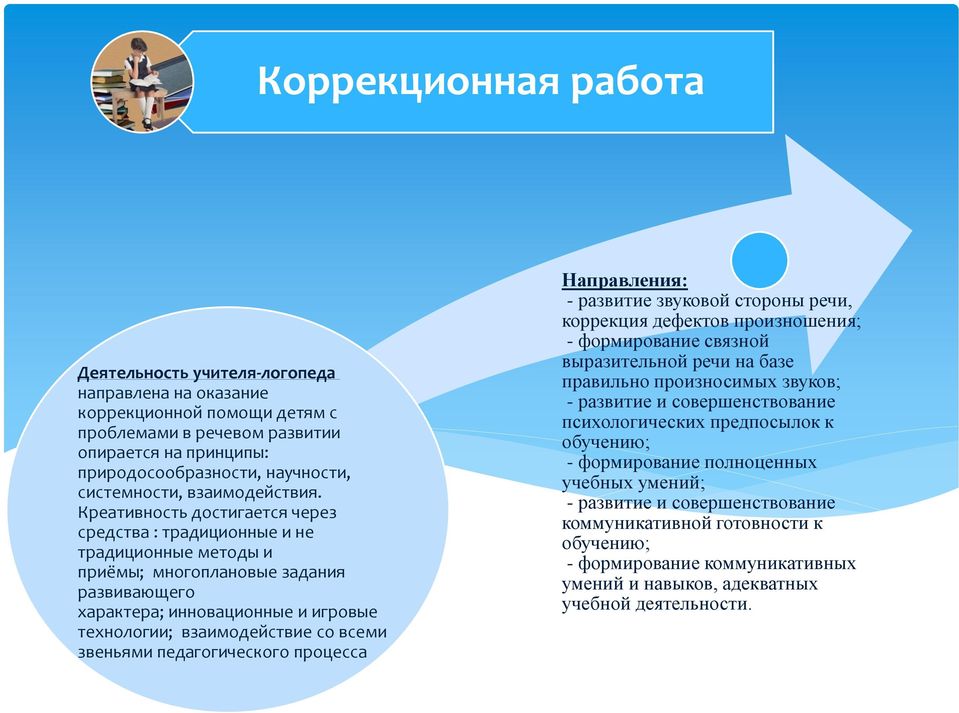
8 ESSAY “Why I became a speech therapist” Each of us remembers the first teacher in his life, and he always remembers his students. The first teacher not only lays the foundation for further development in the child, but also gives a piece of his heart and soul. Therefore, back in school, I decided: I will be a primary school teacher! After graduating from the Rostov Pedagogical College, she worked in a kindergarten. In 2003 she graduated from the Rostov State Pedagogical University with a degree in Preschool Pedagogy and Psychology, and was awarded the qualification of a teacher of preschool pedagogy and psychology. In 2010, she graduated from the Southern Federal University with a degree in Speech Therapy and was awarded the qualification of a teacher-speech therapist. And so, in 2010, I crossed the threshold of my kindergarten 58 as a speech therapist teacher. I teach the word, educate with the word, pay attention to the careful attitude towards it. I think that a speech therapist, or rather a speech therapist teacher, is a teacher who combines the professions of a psychologist, actor, musician, and designer. A speech therapist teacher should be able to pronounce any word, phrase, sentence in such a way that the child wants to speak beautifully or, as speech therapists like to repeat, correctly. Creating the conditions for mastering speech, I do not forget about the attractive environment, each object in which carries a semantic load, aesthetic pleasure and, of course, a mystery or riddle. This is the only way to captivate, interest and invite the child to dialogue. Undoubtedly, success in work depends on professional knowledge, awareness of domestic and foreign achievements related to speech therapy sciences, on creative activity and initiative. I am constantly taking courses. In my work, simply human things come to the fore: to help, caress, sympathize, because the greatest value on Earth is children.
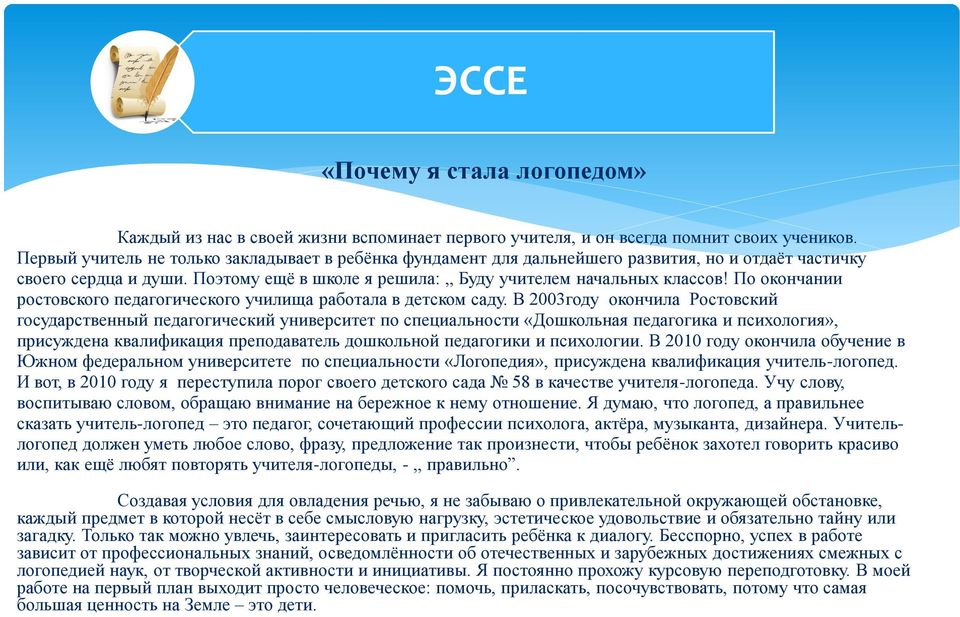
9 ESSAY "Why I became a speech therapist" A speech therapist teacher must certainly be enthusiastic, have something of his own, special, behind his soul. Perhaps that is why my pupils are pleased with their success, they are engaged with enthusiasm. This means that I am not just a carrier and transmitter of information, but also a creator of an emotional mood. I begin all my studies with a smile, and there is no greater joy for me than to see wide-open children's eyes, smiles, to realize that the biggest and most significant thing in the world is being laid here. The first success, and then many victories, inspire the child and contribute to a strong desire to achieve good results. From the interest of the pupil, I stretch a thread-path to his abilities, to learn and discover new things. I think many will agree with me that the most important thing in pedagogical activity is the personality of the teacher, his human qualities, because a callous, rude teacher will not be able to achieve good results. And vice versa, a kind and attentive educates with one of his presence. My pedagogical principle is to help the child open up, instill confidence in him, make him feel his self-worth in educational activities. Children come to me trusting, with their eyes wide open. I see in their eyes a keen interest, to learn something new, not yet explored. The main thing is that this interest does not fade away. Kindergarten is an island of joy, where every child is unique and inimitable, where the world of kindness, the world of health is just as important as the world of knowledge. Why do I love my profession? For the fact that it gives me the opportunity every day to come into contact with the world of childhood, for the uniqueness and unpredictability of every day. Every day, giving children a piece of my heart, the warmth of my soul, I confess with a feeling of deep satisfaction: I have succeeded as a teacher, because I help children!

10 Regulatory documentation On speech therapists and psychologists of educational institutions (Letter of the Ministry of General and Vocational Education of the Russian Federation dated in / 20-4) Instructional letter of the Ministry of Education of the Russian Federation "On the organization of the work of a speech therapy center of a general educational institution" dated (Appendix 5) Bulletin education Model regulation on a special correctional educational institution. Regulations on preschool institutions and groups of children with speech disorders. Approved by Decree of the Government of the Russian Federation dated 288 Model regulation on a special (correctional) educational institution for students, pupils with developmental disabilities (Approved by Decree of the Government of the Russian Federation dated, as amended by Decree of the Government of the Russian Federation dated). Bulletin of Education Model regulation on a preschool educational institution (Decree of the Government of the Russian Federation dated July 1, 1995 677 with amendments and additions approved by resolutions dated February 14, 1997 179, dated December 23, 2002 919) Model regulation on an educational institution for children of preschool and younger school age (Decree of the Government of the Russian Federation of September 19, 1997 1204, as amended by Decree of December 23, 2002 919) Instruction letter of d 89 / "On the implementation of the right of preschool educational institutions to choose programs and pedagogical technologies" Instructional and methodological letter Ministry of Education of the Russian Federation from g. 65 / 23-16
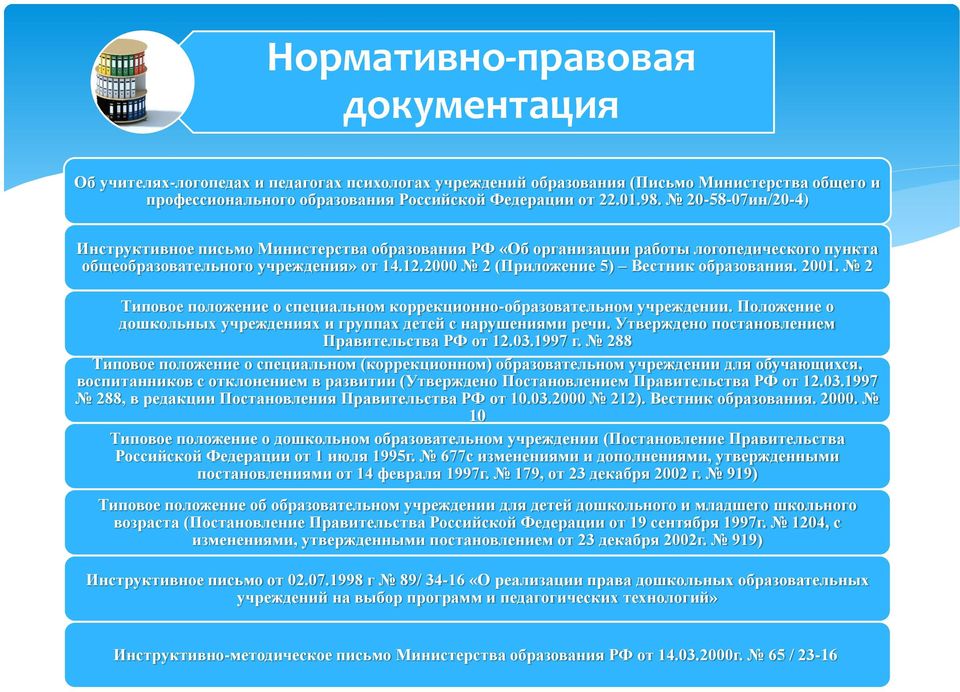
11 Programs Filicheva T.B., Chirkina G.V., Tumanova T.V. - "Correction of speech disorders. Programs for preschool educational institutions of a compensatory type for children with speech disorders." Publishing house "Enlightenment", p. A set of correctional and developmental educational programs that takes into account the needs of all types of speech therapy groups in the system of preschool educational institutions for children with speech disorders. The structure of the collection presents four programs aimed at eliminating phonetic and phonemic underdevelopment of speech, general underdevelopment of speech, stuttering and impaired speech development complicated by bilingualism. Each program is accompanied by an explanatory note and an appendix, which is given at the end of the collection.

12 Documentation of the teacher of the speech therapist Speech card for each child; Register of registration of children; Attendance sheet for individual lessons; Long-term work plan of a speech therapist; Perspective-thematic work plan; Notebooks for individual work; Individual plan of work with the child; Lesson grid; List of children; Report; Cyclogram; Software and methodological support.
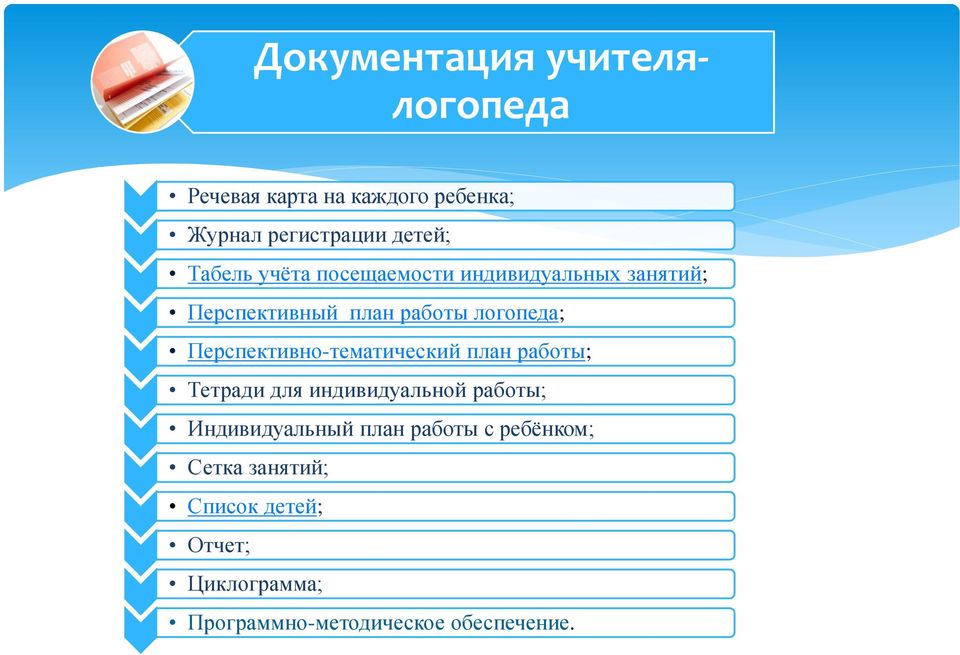
13 Self-education "PREVENTION OF READING AND WRITING DIFFICULTIES IN PRESCHOOL AGE" In recent years, the number of children experiencing various learning difficulties in primary school has increased significantly. This is the mastery of the reading skill, and slow writing, and the failure to master the rules of spelling, spelling errors with knowledge of spelling and grammatical rules, the phonetic type of writing, the lack of "flair" for spelling. The problem of violations of writing (dysgraphia) and reading (dyslexia) is one of the most relevant for school education, since writing and reading turns from a goal into a means of further obtaining knowledge by students. Therefore, today speech therapy is faced with questions: How to reduce the number of children who have difficulties in mastering writing and reading? Is left-handedness or left-handedness related to reading and writing? Is it possible to prevent possible reading and writing disorders in preschool age?

14 Self-education "PREVENTION OF DIFFICULTIES IN MASTERING READING AND WRITING IN PRESCHOOL AGE" Paramonova, showed that more than half (55.5%) of older preschool children are not ready to start school and, therefore, are doomed to fail in the Russian language. The maturity of mental processes - the prerequisites for the successful acquisition of spelling and literacy - can be checked before the child enters school. Speech therapy practice confirms the prevention of difficulties in mastering reading and writing must be carried out at preschool age. The main correctional tasks of prevention are: 1. Development of constructive praxis and tactile sensations; 2. Improvement of visual-spatial perception; 3. Formation of reading skills and work on reading technique; 4. Development of auditory perception.
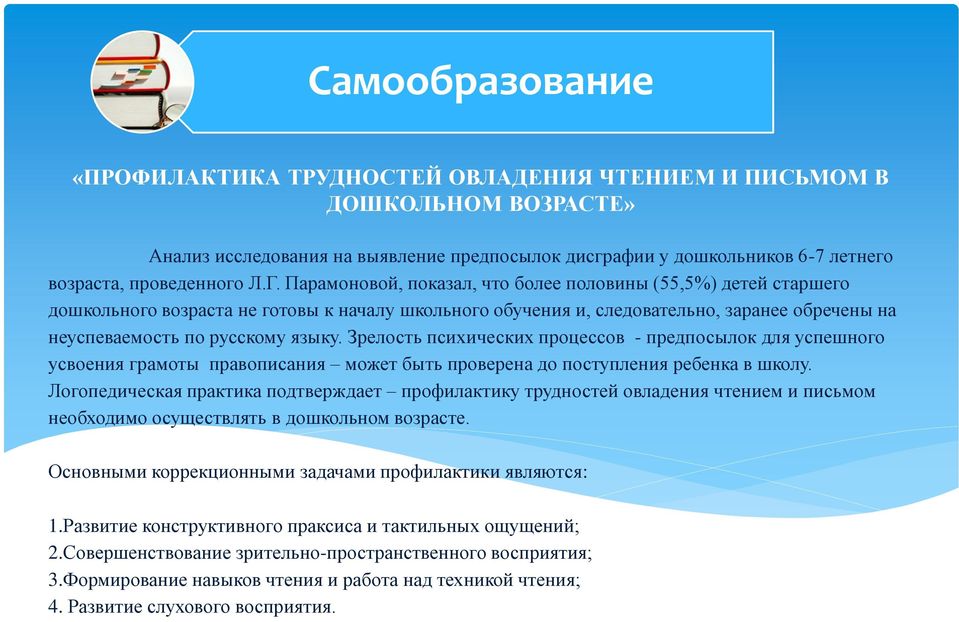
15 Methods and techniques of preventive work The first block Development of visual attention and visual memory: expansion of the field of vision; development of stability, switchability, increase in visual attention and memory; development of stereognosis. Formation of stereognosis and ideas about face and body schemes: development of ideas about face and body schemes; development of appropriate skills of orientation in space; activation of body sensations as a coordinate system; formation of spatial modeling and constructive praxis. Development of hand-eye coordination: development of oculomotor movements; improvement of sensations of articulatory postures and movements; formation of perception of various modality; development of tactile sensations; development of manipulative activity and fine motor skills; development of shaping movements in the depiction of given figures. The development of space-time representations: orientation in the duration and sequence of phenomena that make up the whole; development of visual-subject perception; isolating the features of an object; perception of spatial features of flat and voluminous objects; differentiation of similar color backgrounds and geometric shapes.

16 Methods and techniques of preventive work Second block Development of auditory attention: expanding the scope of auditory perception; development of auditory functions, orientation of auditory attention, memory; formation of the foundations of auditory differentiation; improvement of phonemic perception; awareness of the sound side of speech. Development of a sense of rhythm: the formation of the rhythmic-intonational side of speech; the formation of a sense of a sentence as a lexical unit, characterized by rhythmic and intonational completeness; development of sensorimotor components of the sense of rhythm; formation of intonational expressiveness and rhythmic-intonational parameters of the word. Formation of phonological structuring: formation of the syllabic structure of a word, the ability to visually control the movements of the lower jaw when pronouncing syllable-forming vowels; analysis of syllables and words; development of speech-auditory, speech-motor and visual image of sounds; formation of phonemic analysis; development of analysis and synthesis skills based on exercises in word formation. Work to prevent specific errors in reading and writing should be carried out with children with various speech pathologies: with ONR, FFNR, etc. It is also very useful for children in mass groups of 5-7 years of age. Early diagnosis, prediction of school problems and correction of difficulties are the key to successful education of children in school.
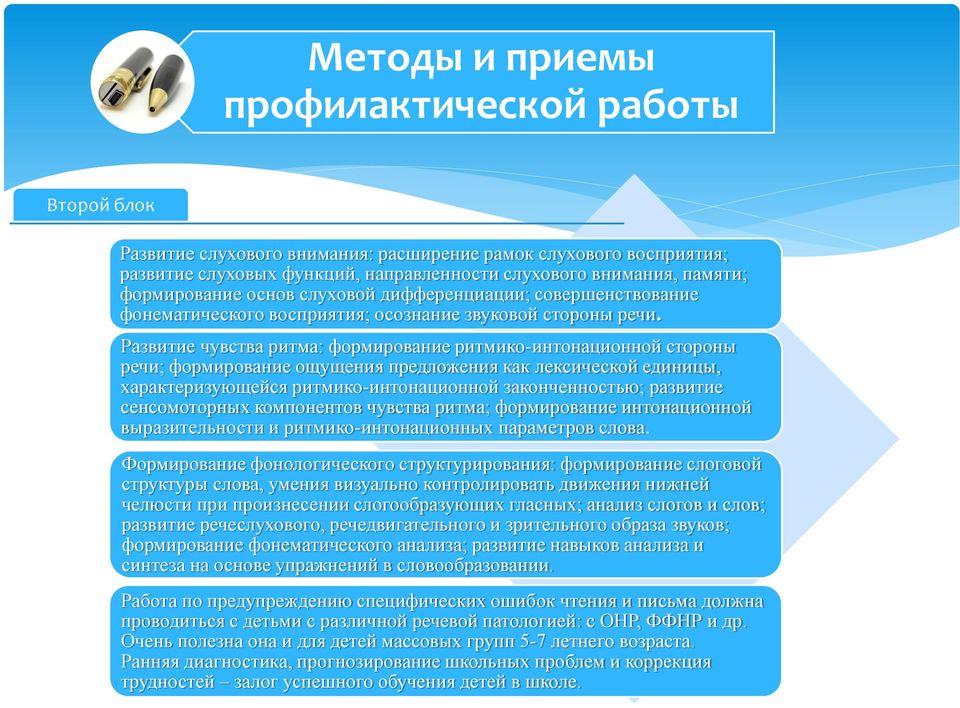
17 Use of ICT in work A child in dialogue with a computer program deepens and expands his knowledge, the “friendly attitude” of a computer to a child is an incentive in work and not only increases the level of knowledge on a particular topic, but also demonstrates the potential use of a computer in further pedagogical activity. The correct use of the computer leads to an increase in the motivation of children to work with a speech therapist teacher, to an adequate assessment of their actions by the child, to the formation of cooperation between the child and the speech therapist. The child perceives the speech therapist as an assistant, whose advice must be heeded. At the same time, such a form of communication is formed between the child and the teacher, which is necessary for both the preschooler and the younger student to study at school. Communicating with the computer hero during the lesson, the child begins to ask the speech therapist about what needs to be done in order to complete this or that task. He rejoices when the "independent" computer hero "gives" him gifts. At the same time, the child constantly strives to correct his mistakes so that his “computer friend” and speech therapist will praise him. At the same time, the speech therapist also has an incentive to work, an interest in the further organization of their activities. Interest becomes mutual, and this is already the key to successful work. The child is looking forward to the next lesson, in addition, he strives to do "computer" homework.
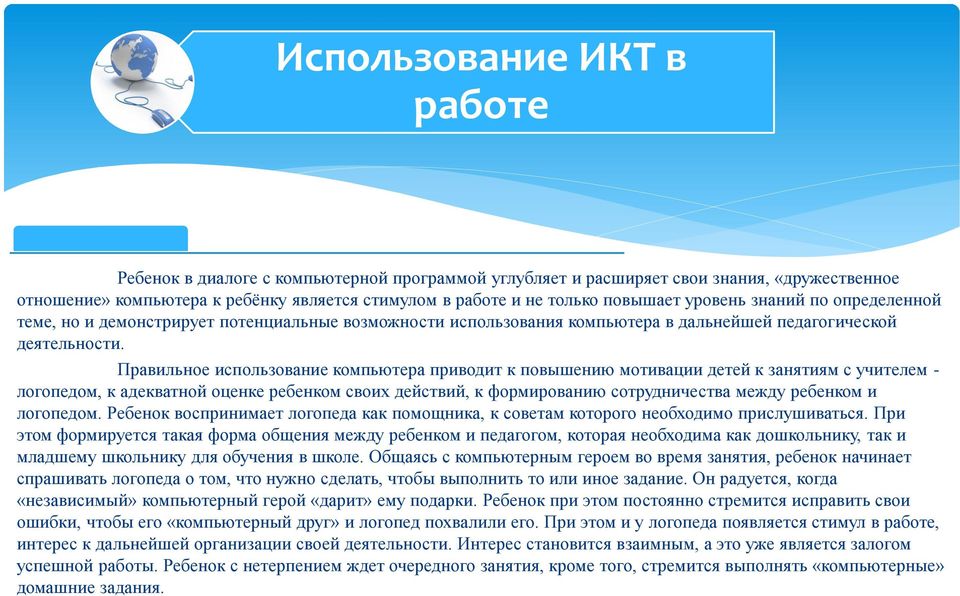
18 Educational games and programs 1. Finger gymnastics (speech development of preschoolers). 3. Learning by playing: I read. 5.Kid and nature 7.Soon to school! Learning to read. (educational collection) 9.Soon to school! The development of speech. 11. Super kids. Algebra in a playful way. 13. Garfield preschoolers. Fundamentals of vocabulary and spelling. 15. Children's encyclopedia about animals. 2. I learn letters and read by syllables. 4. How a person works (audio encyclopedia) 6. Sounds of wildlife. Along the forest path. 8. I am learning to read words. (educational collection) 10.Soon to school! We learn to speak correctly. 12. Super kids. Speed reading practice. 14. Gosha the dragon saves the turtles. (counting, reading, creativity, logical thinking) 16. Bolek and Lelik in kindergarten. 17. Turtle Ozzy. 18. Superbabies. Cheerful dictation.

19 Recommendations to parents 1. The value of correct speech is enormous for a person of any specialty. Incorrect speech of the child makes it difficult for him to communicate with others, affects his general development, character, and in the future may be the reason for his poor performance at school. 2. The child's speech develops by imitating the speech of the people around him. In this regard, the child should hear only grammatically correct speech in his environment. 3. The first sample of speech for a child is the speech of his loved ones. Parents are the first mother tongue teachers for their child. The family is the first school. 4. Without the help of parents, it is difficult for a child to master the correct speech. Talk to your child. Listen to him carefully, do not interrupt, speak and answer all his questions slowly, clearly, expressively, in a medium-strength voice, pronounce sounds and words correctly - this will help the child to master the correct speech more quickly.
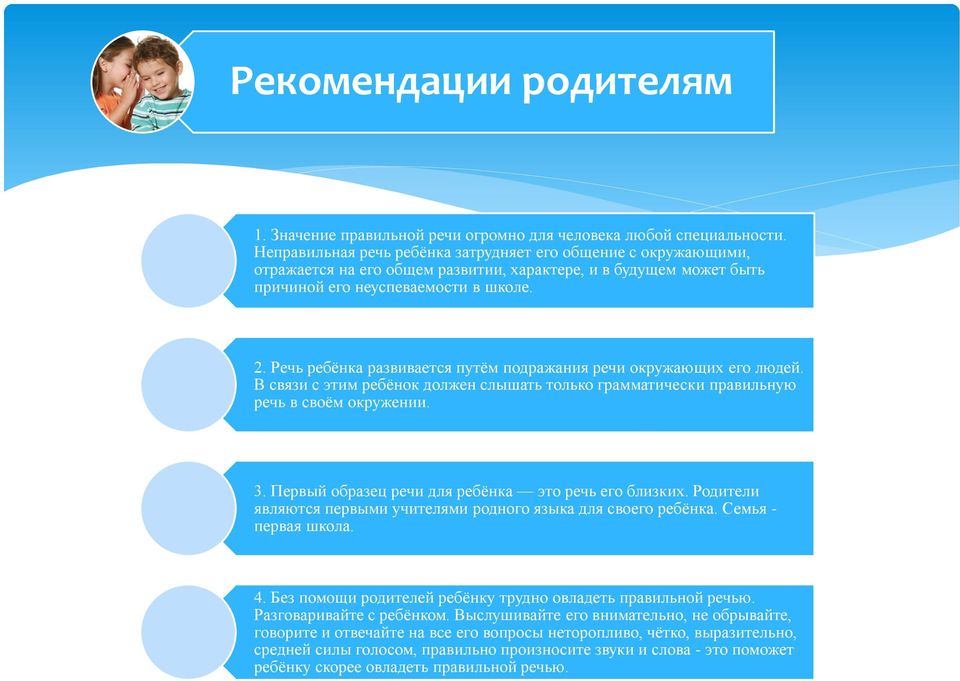
20 Recommendations to Parents 5. Do not imitate the child's incorrect speech, do not impose incorrect made-up words on the children. Do not talk to the child using substitute words, such as yum - yum (eat), meow (cat), etc., speak immediately in generally accepted words. Otherwise, you will delay the correct speech development of the child. 6. When a child’s speech appears, try to speak with him in simple words, short phrases, observing pauses between words and sentences, then the child, imitating your speech, will learn to speak correctly. 7. Monitor your baby's speech development and development, starting with babbling and the appearance of the first words. If your child has a speech delay, contact a specialist. 8. Instill in children the correct speech skills, do not allow the child to speak quickly. Slow, clear, correct, expressive speech contributes to the correct speech development of the child. 9. Do not overload the child with speech material. When reading, explain to the child the meaning of words and expressions. When choosing literature for reading, consider the age of your child and his peculiarities of perception and emotional state.
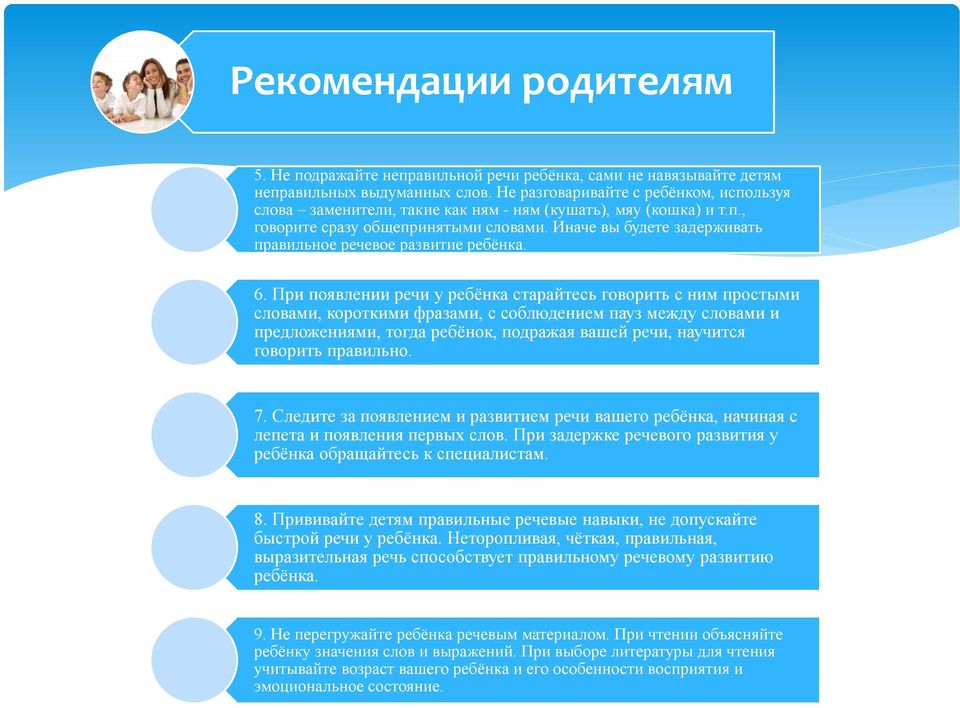
21 How to develop a child's speech Speak calmly, at a normal pace, with intonation. Speak using CORRECTLY constructed phrases, sentences. Your sentence should be 1 2 words longer than the child's. If your child is still speaking only in one-word sentences, then your phrase should consist of 2 words. Talk to your child during all activities such as cooking, cleaning, dressing, undressing, playing, walking, etc. Talk about what you are doing, see what the child is doing, what other people are doing, and what your child is seeing. Keep a temporary pause so that the child has the opportunity to speak and answer questions. Ask OPEN questions. This will encourage your child to use multiple words to answer. For example, ask "What is he doing?" instead of "Is he playing?". If the child finds it difficult to answer when asking a question, use the word "or". For example: "The boy is jumping or running."
22 How to develop a child's speech Listen to the sounds and noises that surround us. Tell the child: "Listen to the dog barking, but the wind is making noise," etc. And then ask "What is it?" It can be a barking dog, the sound of the wind, an airplane engine, the rustling of leaves, the murmur of a stream, etc. If the child says only one word, start teaching him short phrases. Use words your child knows. Add color, size, action. For example, if a child says "ball", teach him to say "Big ball", "Tannin ball", "round ball", etc. in succession. Tell a short story, a story. Then help the child tell the same story to you or someone else. When in doubt, ask your child probing questions. If the child uses only a few words in speech, help him enrich his speech with new words. Choose 5-6 words (body parts, toys, products) and name them to the child. Give him the opportunity to repeat these words. Don't expect your child to pronounce them perfectly. Encourage your child and keep memorizing them. After the child has said these words, enter 5-6 new words. Continue adding words until the child recognizes most of the objects in life. Get busy every day. Do most of the lessons in a playful way. Working with a child should activate speech imitation, form elements of coherent speech, develop memory and attention. Don't forget: Teach your child by playing with him. Your child is the most wonderful!
23 Recommendations for Parents of Children with Speech Disorders Learn to observe, listen, reason, express your thoughts clearly and clearly. Remember that as a child grows up, the habit of speaking incorrectly in a child is fixed and is less amenable to correction. Cultivate perseverance, independence. Be patient, do not expect quick results and be sure to complete the pronunciation correction course in your child. Know that bad speech cannot be corrected in one or even several sessions. This will require time and joint efforts of the speech therapist, the child and the parents. Do not fix the child's attention on what he does not succeed, it is better to cheer him up. Remember, the timing of overcoming speech disorders depends on the degree of complexity of the defect, on the age and individual characteristics of the child, the regularity of classes, the interest and participation of parents in corrective work.
24 Recommendations for parents of children with speech disorders Show the child to a child psychiatrist, neuropathologist, ophthalmologist, otolaryngologist, speech pathologist. Introduce set sounds and fixed sounds into everyday speech, developing the child's self-control skill. Do your homework with him systematically and accurately. Gradually complicate the requirements for the child's speech. Practice daily or every other day in a friendly, playful way. Observe the accuracy and phased execution of tasks.
25 Correction of sound pronunciation Correction of sounds is carried out in stages: 1st stage preparatory (special exercises for lips, tongue, voice, breathing); 2nd stage staging (causing sounds by imitation or using special techniques); 3rd stage automation (fixing sound in syllables, words, sentences); 4th stage differentiation (in cases of replacing one sound with another). The preparatory stage and the stage of fixing a new sound in many children is slow and requires a long training. To achieve the correct position of the lips, tongue, fast, free, clear pronunciation of sound in speech, you need to practice a lot. Please practice at home! If the sound is not yet pronounced, perform articulation gymnastics. If the sound is set, fix it: name the pictures, determine the place of the sound in the word (beginning, middle, end of the word), make sentences with these words, learn the speech material recorded in the notebook with the child, be sure to follow the delivered sounds in everyday speech. Do not forget to follow all the recommendations of the speech therapist. I wish you success in teaching your child the correct speech!
Sensitive periods of development. Consultation of the teacher-defectologist Golubeva Yu.L. From an early age, a person experiences sensitive periods. Translated from Latin, the word "sensitive" means "sensitive."
PORTFOLIO OF THE TEACHER-SPEECH THERAPIST ROMANENKO TATYANA ALEKSANDROVNA GBOU SCHOOL 1355, Moscow, 2015 VISIT CARD OF ROMANENKO TATYANA ALEKSANDROVNA TEACHER-SPEECH THERAPIST FIRST QUALIFICATION CATEGORY HIGHER
Education and upbringing of preschool children with phonemic and phonemic underdevelopment of speech
2 Explanatory note The work program for the correction of articulatory-acoustic dysgraphia was compiled in accordance with the Federal State Educational Standard based on the methodological manual
THE ROLE OF THE FAMILY IN REINFORCING THE SUPPLIED SOUNDS The level of development of the child primarily depends on the atmosphere that is created consciously, and for the most part, unconsciously, by adults in the family. Degree
Speech development of the child. The active speech of the child goes through several stages of development. The very first manifestation of a child's speech is a cry. 2-3 months Shouting is replaced by humming. Cooing pronunciation of vowels
Municipal budgetary preschool educational institution "Kindergarten 73" (MBDOU 73) "73 numbers nylpi garden" school dyshetonya municipal kondeten voziskis uzhyurt (73 number SHDMKVU) Agreed
Annotation to the work program for the correction of speech disorders for students in grades 1-4 with disabilities (NODA + mental retardation), teacher-speech therapist Vasilyeva N.V. mental retardation (intellectual impairment).
1. General provisions 1.1. This Regulation has been developed in accordance with: - Federal Law "On Education in the Russian Federation" 273-FZ dated December 29, 2012; - Order of the Ministry of Defense of the Russian Federation of October 17, 2013 N 1155
Department of Education of the Administration of the City of Nizhny Novgorod Municipal budgetary preschool educational institution "Kindergarten 37" (MBDOU "Kindergarten 37") APPROVED by Order 194 of 01.09. 2015
Consultation for educators "Education of the sound culture of speech in preschool children" In recent years, there has been a sharp decrease in the level of speech development of preschoolers. It is primarily related
Municipal budgetary preschool educational institution combined type kindergarten 18 of the city of Stavropol Adopted: At the pedagogical council, protocol 1 "01" 09 2015 I approve: Head of MBDOU
Corrective speech therapy work to prevent dysgraphia, dyslexia in preschoolers One of the main directions of education modernization is to provide a state guarantee of accessibility
Prevention of difficulties in mastering reading and writing at preschool age Pyanova Nelli Pavlovna, speech therapist teacher In recent years, the number of children experiencing various difficulties has increased significantly
OGKU "Kostroma Regional Center for Psychological, Pedagogical, Medical and Social Assistance" Central Psychological, Medical and Pedagogical Commission Compiled by a speech therapist teacher Poltavskaya O. A. Why is it necessary
Municipal budgetary educational institution kindergarten 11 "Mashenka" Pedagogical project "Lapbook as a means of teaching preschoolers with TNR in the conditions of the Federal State Educational Standard" Prepared by: speech therapist Pomazkova
Municipal budgetary preschool educational institution "Kindergarten of a combined type 5" in the city of Leninogorsk, municipal formation "Leninogorsk municipal district" of the Republic of Tatarstan Adopted:
Regulations on the group of compensating orientation of the Municipal budgetary preschool educational institution of a kindergarten of a combined type 77 of Lipetsk ADOPTED: by the General Meeting of the Municipal
In accordance with part 3 of Art. 79 of the Law on Education in the Russian Federation, special conditions for obtaining education by students with disabilities are understood as the conditions for training, education
Municipal budgetary preschool educational institution "Kindergarten of the combined type" Skazka ", Dolinsk, Sakhalin Region Report for teachers:" The use of ICT in corrective speech therapy
Explanatory note The general educational program of the Municipal Budgetary Preschool Educational Institution of Vladimir "Kindergarten 97 combined type" provides: diversified development
Additional general education program Age of children: 3-5 years Implementation period: 2 years. "Speech" (introductory level) Program developer: Pokrovskaya I.V. additional education teacher
ANALYSIS OF THE WORK OF THE LOGOPEDIC SERVICE OF THE MBOU GYMNASIUM IN ZERNOGRAD FOR THE 2013-2014 ACADEMIC YEAR. The activities of the speech therapy service are carried out in accordance with the legal acts in the field of protection
KIZYMA Galina Vasilievna, educator, MBDOU 4 "Snegurochka", Salekhard, YaNAO Tyumen region, Russia DEVELOPMENT OF CONNECTED SPEECH IN CHILDREN WITH SEVERE SPEECH DISORDERS Speech is one of the most important factors
School for preschoolers. Middle group (children from 4 to 5 years old) Main subjects studied: 1. Speech development. Comprehensive classes using gaming techniques: prepare children for the formation of grammatical
MUNICIPAL EDUCATIONAL INSTITUTION "SEVERAGE EDUCATIONAL SCHOOL 8" (MOU "Secondary School 8") 155900, RUSSIA, Ivanovo Region, Shuya, st. Vikhreva, d.65. phone: (49351) 4-34-92, (49351)
ARE YOU READY FOR SCHOOL? READINESS TO STUDY AT SCHOOL Readiness to learn at school is considered at the present stage of development of society as a complex characteristic of the child, in which the levels of
A PROFESSIONAL APPROACH TO SOLVING ISSUES OF SPEECH DEVELOPMENT OF PRESCHOOL CHILDREN From the experience of a speech therapist teacher "Two steps to school" The author's method for preventing dyslexia and dysgraphia using electronic
Those who have impairments in the development of oral speech, in mastering the main educational program of preschool education. 2.2. The main tasks of the logopoint are: ensuring the correction of developmental disorders
APPROVED: Head of MBDOU d / s 1 Logunova L.V. order 47 of May 19, 2016 minutes of the teachers' council 5 of May 19, 2016 CURRICULUM OF THE MUNICIPAL BUDGET PRESCHOOL EDUCATIONAL INSTITUTION FOR CHILDREN
1. General provisions 1.1. This Procedure for organizing work in a compensating group (hereinafter referred to as the Procedure) regulates the activities of compensatory groups for children with disabilities
CORRECTIONAL PEDAGOGY, DEFECTOLOGY Baklanova Oksana Anatolyevna educator of MDOU "D / S 15 KV "Golden Fish", Olenegorsk, Murmansk Region EFFECTIVE FORMS AND METHODS OF WORKING WITH CHILDREN WITH HIA. USAGE
1. General Provisions. 1.1 This provision regulates the activities of speech therapy groups in preschool educational institutions in accordance with the Federal Law "On Basic Guarantees of the Rights of the Child in the Russian Federation" dated 07/24/98.
"The main components of a child's readiness for schooling" Readiness for school includes three main components: physical, pedagogical and psychological readiness. Psychological readiness
Approved by the Head of the Kindergarten "Kolobok" I.N. Rudnitskaya Minutes of the teachers' council 3 dated 06.0.06 ANALYSIS of the activities of the speech therapy service of the MBDOU Myskamensky kindergarten "Kolobok" for the 0-06 academic year Speech therapist teacher
Annotation to the work program of the teacher-speech therapist MBDOO 7 "Rainbow" Art. Giaginskaya The Federal State Standard for Preschool Education defines targets for social and psychological characteristics
WELCOME! GREETINGS, speech therapist MBDOU kindergarten 27 I GENERAL INFORMATION My view of the world "The world will be happy only when every person has the soul of an artist. In other words,
1 2 1. General provisions 1.1. This Regulation has been developed for the State Budgetary Preschool Educational Institution "Kindergarten 121 combined type" (hereinafter referred to as the Institution) in accordance
SPEECH THERAPY SUPPORT OF PUPILS OF THE DOE Teacher-speech therapist Slyusarenko I.N. The goal is to create a correctional and educational space to create conditions for ensuring equal starting opportunities
Explanatory note. Work program to eliminate violations in oral and written speech among students of grades 4. Developed on the basis of the Federal State Educational Standard, Law
8.Fund of assessment tools for conducting intermediate certification of students in the discipline: General information 1. Department of SPiSP 44.03.03 Special 2. Direction of training (defectological) education,
MBDOU 5 kindergarten of a general developmental type "Kolobok" BEFORE SCHOOL ONE YEAR Consultation for educators of preparatory groups for school Speech therapist: Samoilova T. S. Chebarkul 2014 2015 academic year Child
Considered at the pedagogical council 1 MADOU d / s 79 of the city of Tyumen on August 31, 2016 “I approve” Head of MADOU d / s 79 of the city of Tyumen N.V. Starikov "31" August 2016 Additional general developmental
representatives). 2. GOALS AND OBJECTIVES OF THE SPEECH THERAPY SERVICE OF THE CHILDREN'S HOME 2.1. The main goal of the service is to provide speech therapy assistance to pupils of the orphanage, children under guardianship or being brought up
Adopted at the teachers' council Appendix 11 Protocol 1 to the order of the head of 25.08.2016. MBDOU "TsRR 12" dated 09/08/2016 432 Regulations on the compensatory orientation group for children with phonetic phonemic
COMPREHENSIVE PROGRAMS OF PRESCHOOL EDUCATION: The program "From Childhood to Adolescence" edited by T.N. Doronova "From Childhood to Adolescence" is the first program in which the development and upbringing of a child
Self-analysis of an open subgroup speech therapy lesson at the school level on the formation of phonetic phonemic representations in children 5-6 years old with OHP (Level II-III) Speech therapist: Sergeenko A.V. Acquaintance
Pedagogy PEDAGOGY Lyahina Tatyana Nikolaevna teacher-speech therapist of the highest qualification category MDOU "D / S KV 38" Orekhovo-Zuyevo, Moscow Region INNOVATIVE TECHNOLOGIES IN PREPARING CHILDREN OF PRESCHOOL
Development of a program for a speech therapist teacher to provide paid educational services Speech therapist teacher MDOU "Kindergarten 212" Sidorkina O.N. Targets - actively interacts with peers and adults,
Using Lego technology to prepare children with disabilities to read and write To be a good teacher, you need to love what you teach and love those you teach.
Approved at a meeting of the Pedagogical Council, the protocol dated August 28, 2015 1 Regulations on the speech therapy service in elementary school In the context of the transition of elementary schools to new generation standards, especially
Consultation for parents on the topic: "The role of the family in the development of children's speech" Raising correct and pure speech in a child is one of the important tasks in the general system of work on teaching the native language. The richer and
Annotation to the work program of the first junior group The work program for the development of children of the I junior group was developed in accordance with the content of the educational process of the first junior group of the main
Explanatory note 1. The work program on "Development of speech and preparation for teaching literacy" was compiled on the basis of a comprehensive program for the development and education of preschoolers in the educational system
Powered by TCPDF (www.tcpdf.org) Supplementary Educational Program for Teaching Literacy to Preschoolers "Teaching Literacy to Preschoolers" Section I "Targeted". 1.1 Explanatory note From how the child
Kalashnikova Elena Vladimirovna senior educator Yuzhbabenko Lilia Aleksandrovna speech therapist teacher MBDOU "D / S 71" Belgorod, Belgorod region ORGANIZATION OF A SINGLE SPEECH MODE IN DOO Annotation: in
Tips of a speech therapist teacher on the development of speech of younger preschoolers When does the development of children's speech begin? For parents on that unforgettable day when the baby uttered the first words: mom, dad, give, na. And on
Tasks: 1. organization of work on diagnosing the levels of development of students' speech activity in order to timely identify children with adaptation difficulties due to speech underdevelopment; 2. implementation
WORKING PROGRAM FOR TRAINING FUTURE FIRST GRADE STUDENTS Compiled by: primary school teacher Saifullina M.L. 2014 Explanatory note. One of the urgent problems of education is the problem of training
Annotation to the work program of a speech therapist teacher Plotnikova N. A. for children with ONR Presented "Work program of a speech therapist teacher for children with speech disorders (senior and preparatory preschool age)
I APPROVE Director MBOU SOSH 3 A.V. Ryabova 2014 Work program for preparing children for school in preparatory classes for future first-graders Teacher-Bikmetova A.D. 2014 Explanatory note.
- Essay by a speech pathologist
- Defectologist-speech therapist: what kind of specialty, where to study
- Speech therapy massage for children at home
- Creation of a developing environment in a speech therapy room
- The development of fine motor skills of hands in preschool children
- Sound analysis of the word: what is it and how to do it correctly
- Kemerovo Savelyeva Elena Nikolaevna

 Live Journal
Live Journal Facebook
Facebook Twitter
Twitter